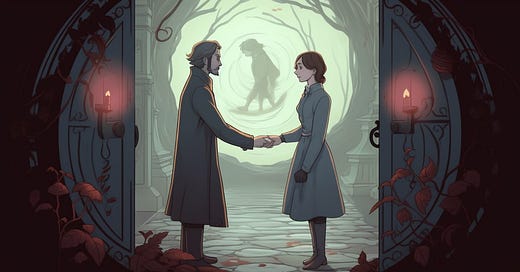On Love and Monsters
Me and Mary could have had something special, but our cross-time relationship might have ended the world...
On this lovely spring TokenBook Tuesday, we’re releasing Frankenstein by Mary Wollstonecraft Shelley.
The Story
I first encountered the classic gothic horror novel, Frankenstein, in a high school English class and immediately fell in love with its author, Mary Wollstonecraft Shelley, who came up with the story as a teenager, on a dare, during a dark and stormy night while traveling through Switzerland.
Our potential cross-time romance was complicated only by my lack of a time-portal and by the fact that Mary was already married when she wrote the novel, to the poet Percy Bysshe Shelley.
Given the chance, I felt I could present a fair argument that Mary was too good for Percy. She might have left him, if only someone were to point out his obvious flaws.
Because how could a brilliant and precocious author of gothic horror fall for a man who would abandon his pregnant first wife to poverty while he traipsed about Continental Europe with a younger woman? Who then got his mistress pregnant? And who married the mistress after driving his abandoned first wife to suicide?
Of course, Mary knew all of that already, being the mistress-turned-bride that she was. But perhaps she’d been too close to the matter to see how morally compromised Percy really was. Sure, he was a talented poet—even I had to admit the one about the ruined statue was fairly decent—but how successful would Percy have been without Mary’s editorial and promotional skills to advance his career?
In my high school fantasy, I cherished the shocked look on Percy Bysshe Shelley’s face as Mary and I stepped back through the time-portal, hand-in-hand, into the modern era.
But then, I had to consider what effect our romance would have on the timeline. Pulling Mary Wollstonecraft Shelley out of the early 19th Century would have been catastrophic.
How different of a future would we have found on our return? Without Frankenstein being published in 1818, the world would have missed its outsized impact on the genres of horror and science fiction, and on the development of publishing and cinema. But in addition to being culturally deprived, we’d likely also be dead.
Frankenstein is literature’s most effective cautionary tale against the hubris of humanity tinkering with technologies beyond our understanding. Kurt Vonnegut claimed that the atomic bomb dropped on Hiroshima might well have been imagined by Mary Wollstonecraft Shelley. Opponents of genetically-modified organisms in our food supply refer to GMOs as “frankenfoods.” The book’s premise has boosted the voices of those who believe we’re moving too quickly into AI development without proper safeguards in place.
For over two hundred years, the message of Frankenstein has been ingrained into our collective culture, acting as a constant brake on our worst impulses with every new technology. It’s pulled us back from the brink of eugenics, back from the brink of nuclear war, and back from multitudinous brinks of other untold horrors.
Without Frankenstein, who known what extinction-level event our species might have stumbled into?
And so, for the good of humanity, I scrapped my time-portal blueprints and gave up on my plans for wooing Mary Wollstonecraft Shelley away from her horrible, horrible husband. She went on with her life, and I went on with mine, both of us forsaking a love that might have torn the world apart.
So…yeah. Frankenstein is a good book. You should definitely check out the Polygon Reader’s Edition TokenBook, which is on sale about the price of a discount ebook, or the Ethereum Collector’s Edition TokenBook, which is on sale for about the price of an average paperback.
Both of these TokenBooks use the Darkblock decentralized encryption/decryption protocol and permanent storage on Arweave to ensure that this Frankenstein can be a treasured heirloom for generations.
—The Mythoversal Cryptoversal





